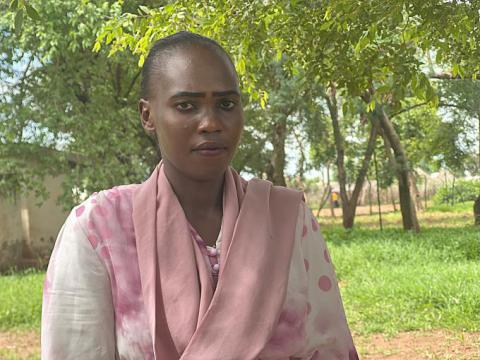A refugee child's passion to work for Save the Children helps to protect the future.

Anur, 27. Photo; Tito Justin / Save the Children
In Maban, the most significant threats to refugee children, as well as host communities are separation from family, sexual exploitation, early marriage, physical harm and psychological distress. Anur, 27, is also a refugee who fled Sudan in 2012 to the Maban camp. She said that with the little education she acquired, she has a role to play to saving the future of children for a better tomorrow.
When Anur arrived in Maban, she didn’t know how to read, speak and write in English because, she studied in Arabic in Sudan. With an ambition to work for and with children, Anur then went to Uganda to take an English course. In 2016, Anur returned to Maban to complete her secondary school so she could work in the refugee settlement. Fortunately, Anur’s dream of working for and with the children came true. She now works for Save the Children as senior case worker.
Her role is to manage unaccompanied, separated and orphaned children including cases of early marriage, forced marriages and other sexual abuses. She says cases of early or forced marriages are difficult to handle or manage because most of these cases benefit the parents of the girl, so they tend to hide the issues. Through awareness, psychosocial support and training, Anur and the team have worked hard to reduce cases of child marriage and exploitation in Maban refugee camp.
Additional to Anur’s roles stated above among others, she also engages and strengthen capacity of youth structures in the camp.
Interviewee’s story in her own words (Quotes):
“I like working for Save the Children as a senior Case Worker. I manage orphaned children, cases of early marriage, forced marriages and sexual exploitation and abuse. Cases of early or forced marriages are difficult to manage because most of these cases benefit the parents of the girl, so they tend to hide the issues.
There used to be persistent cases of early or forced marriages. I used to handle up to 2-3 cases a day. I like working in the community, with children and women. We do conduct training and awareness to the community, and now the cases have reduced. Sometimes in a day, there are no cases being reported.
I like working for Save the Children because it helps me to protect children from harm and secure their future. Most of the challenges we have here is limited basic needs for children. It could be good to provide basic needs such as food, education, water and clothes to the children and the vulnerable people in the camp so that children do not involve into harmful practices.
I want to thank Save the Children for protecting the future of children in the camps through the psychosocial support, training, family tracing and re-unification and awareness activities that we do in the camps. Besides working to save the vulnerable people in the camp, the work is also helping me to support my siblings in school. Without Education, Life cannot go well”
According to the Maban Refugee commission, there are over 200,000 refugees and an estimated 45,238 host communities in Maban. Save the Children provides child protection case management for Unaccompanied and Separated children (UASC) and other children at risk; recreational and psychosocial support services, youth engagement, strengthening child and youth community structures, awareness raising and coordination with other stakeholders.
Written by: Tito Justin/ Save the Children
 South Sudan
South Sudan